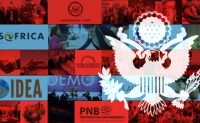Gauging the Quality of Public-Private Partnership Programs Involving U.S.-Based Diasporas
Principal Investigator:
Deborah Trent, CPD Research Fellow 2014-16
Contributing Researcher:
Naoto Okura
Governments face a lack of resources to meet citizen demands and collective interests at home and abroad. Increasingly they recognize and use public-private partnerships (PPPs,) to leverage private and non-profit sector acumen, motivation and other human resources. In addition non-governmental/commercial infrastructure and financial contributions strengthen credibility in public diplomacy (PD) projects. In public diplomacy (PD), the types and quality of PPPs vary widely. Although based on mutual interests, PPPs also involve negotiating divergent interests, e.g., conditions for government funding, environmental sustainability concerns, profit-taking. Mediating underlying conflicts complicates the process of convening and administering PPPs inclusively, making it difficult to sustain and institutionalize project results.
This project will explore PPP efforts partially supported by the U.S. government or city governments to establish or expand international economic, cultural, educational, and other ties, and the extent to which they engage U.S.-based diasporas from various world regions. Migration continues to increase, and diasporas – with transnational identities, strong and diverse cultural bonds spanning generations, well-honed cross-cultural competencies, and a broad range of homeland-oriented interests – are key PD actors. The quality of communication and partnership processes and outcomes will be explored by conducting interviews with PPP participants in diaspora organizations and other civil society and private sector organizations as well as government officials and non-governmental project administrators.
The aim of this research project is to expand efforts to evaluate current policy to engage with and invest in projects with diaspora organizations, aka “diaspora diplomacy.” It will attempt to identify the extent to which federal- and city government-initiated PPPs with international goals include diasporas, and whether inclusive and participatory conflict mediation is evident in them. The project will further investigate how PPP projects involving diaspora engagement influence bilateral interests, and what implications such influence has for theory, policy, and practice.
Read Trent's CPD Perspectives article, "Many Voices, Many Hands: Widening Participatory Dialogue to Improve Diplomacy's Impact," here.








